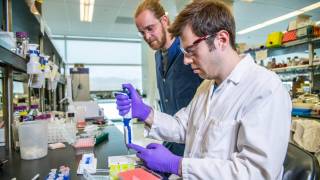Herpes Simplex Virus and Neurodegenerative Diseases Linkage Identified

A new study by researchers at the University of Illinois Chicago (UIC) suggests that when the protein optineurin (OPTN) is present in cells it restricts the spread of herpes simplex virus type 1 (HSV-1).
This study shows that OPTN selectively targets HSV-1 tegument protein, VP16, and the fusion glycoprotein, gB, to degradation by autophagy.
OPTN deficiency unveils severe consequences for recruitment of adaptive immunity and suppression of neuronal necroptosis.
Furthermore, Ocular HSV-1 infection is lethal without OPTN and is rescued using a necroptosis inhibitor.
In a “first of its kind” study published recently in the journal Nature Communications, researchers also found a potential direct connection between neurodegenerative diseases, such as Alzheimer’s disease, amyotrophic lateral sclerosis (ALS), glaucoma, and the herpesvirus.
Led by Dr. Deepak Shukla, the Marion H. Schenk Esq. Professor in Ophthalmology for Research of the Aging Eye, and vice chair for research at UIC, these researchers sought to discover why HSV-1 can become fatal for individuals who are immunocompromised but not for healthy individuals.
Herpesviruses naturally infect the central nervous system and can result in degenerative brain and eye disorders, as well as encephalitis.
However, in most individuals, the virus is suppressed during a primary infection before it can significantly damage the central nervous system.
The new research suggests why HSV-1 is suppressed.
OPTN, a conserved autophagy receptor, selectively targets HSV-1 proteins to degradation by autophagy, explained Tejabhiram Yadavalli, a co-author of the study and visiting scholar at UIC’s department of ophthalmology and visual science.
“OPTN stops the virus from growing and it stops it by autophagy — engulfing the virus particles inside tiny vesicles called autophagosomes. The autophagy that happens is very selective. That has meaning for other viruses as well,” Dr. Shukla said in a related press release
The researchers believe the results from this study will apply to eight different human herpesviruses.
For the study, mice with removed OPTN genes were infected with ocular HSV-1. The virus growth was much higher in the brains of animals without OPTN, killing local neurons and eventually leading to animal death.
This shows there is a faster degeneration of neurons when OPTN is not there.
Additional studies are being planned to examine naturally occurring mutations in OPTN, such as the ones reported in glaucoma and ALS patients, and how they may affect neuronal health and HSV-1 infection, Shukla explained.
“Where you have mutated OPTN plus herpes, you have the recipe to create a disaster in terms of neurodegeneration,” Shukla said.
“The study also shows there is an impairment of immune response when there is a deficiency in OPTN. OPTN is needed to signal an influx of proper immune cells at the site of infection. When you don’t have it, you have issues,” added Chandrashekhar Patil, also a co-author of the study and a visiting scholar at UIC’s department of ophthalmology and visual science.
Some of those issues could include neurodegenerative disorders, which researchers believe further research may show.
“We think we will have data to show other viruses, such as Epstein-Barr, Kaposi’s sarcoma, varicella-zoster, are all going to share this mechanism because they share homologous proteins,” Shukla said.
Because the herpes virus sits in neurons forever, there is speculation it is connected to neurodegenerative diseases.
The immune system requires inflammation to fight off the virus constantly, and neurons have some degree of damage because of this continuous immune response, according to Dr. Tibor Valyi-Nagy, professor of pathology, director of neuropathology at UIC, and research collaborator on the study.
The study also showed that animals without OPTN and infected with HSV-1 after 30 days lost the ability to recognize objects.
Shukla said this could be an indication that having HSV-1 along with a mutation of OPTN could accelerate neuronal damage, which would translate into cognitive impairment.
“Part of our translational research can be how can we correct the problems with OPTN so that we don’t have issues with neurodegeneration,” Shukla said.
These results place OPTN at the crux of neuronal survival from potentially lethal CNS viral infections.
Additional authors are Joshua Ames, Rahul Suryawanshi, James Hopkins, Alexander Agelidis, Chandrashekhar Patil, and Brian Fredericks, all of UIC, and Henry Tseng of Duke University Medical Center. No industry conflicts were disclosed.
This research was supported by the National Institutes of Health and National Eye Institute grants and the Butner Pioneer Award, Duke Health Scholars, and Research to Prevent Blindness unrestricted funds.
As of October 13, 2021, the U.S. FDA has not Approved a herpes vaccine. Vaccine candidates are listed on this webpage.
PrecisionVaccinations publishes fact-checked research-based vaccine news.
Our Trust Standards: Medical Advisory Committee
























